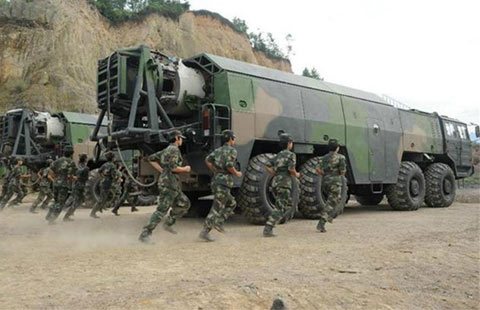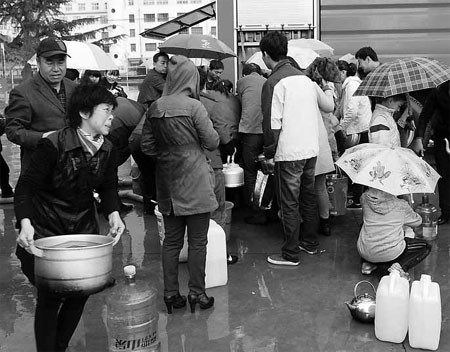Response to tainted water raises concerns
Updated: 2014-04-14 07:11
By Xu Wei in Beijing and Xue Chaohua in Lanzhou (China Daily)
|
||||||||
As local authorities in Lanzhou, Gansu province, continued to investigate the city's tap water contamination on Sunday, experts and local residents have raised questions over the delayed response and lack of timely information from authorities and the water supplier.
The contamination was caused by a residual oil leak stemming from an oil tank explosion in 1987 and a fire in the residual oil pipeline, according to a preliminary investigation by the city government.
Authorities suspect the residual oil contaminated the underground water near a duct between two water works, bringing hazardous levels of benzene into the city's tap water, the city government said on Sunday.
The local authorities have pumped more than 800 metric tons of water containing the residual oil from 26 pits that were dug near the tap water channel, it said.
High levels of benzene, which reached 118 micrograms per liter, were first detected in the city's tap water at 5 pm on Thursday, and the levels reached 200 micrograms per liter at around 2 am on Friday. Under national standards for tap water, the level of benzene must not exceed 10 micrograms per liter.
However, the hazardous level of benzene was not made public until around 12 noon on Friday when Xinhua News Agency published the first report on the pollution. In a micro-blog post, the city government confirmed the contamination at around 4 pm on Friday, close to 23 hours after it was first detected, and it advised residents not to drink tap water for the next 24 hours.
The slow response from the authorities has drawn criticism from residents.
"We wonder what the authorities and tap water supplier were doing during this time period. If the water is poisonous, why not tell us stop drinking it as soon as possible," said Dong Junde, 33, who lives in the city's Chengguan district.
Ma Jun, director of the Institute of Public and Environmental Affairs, an NGO that researches water pollution in China, also questioned the emergency response from the Lanzhou authorities.
"The delayed information release from the authorities is not a matter of procedures. It is a matter of informing the public or not," he said.
Ma said the incident has also brought the city's emergency response plan for environmental issues into question.
Tian Huaqiang, a spokesman for Veolia Water, a Sino-French joint venture and the sole water supplier for urban Lanzhou, insisted information was released in a timely manner.
"The detection of benzene is a time-consuming process," he told China Youth Daily.
Yu Haiyan, Lanzhou's Party chief, said during a work conference on Saturday that the authorities' measures after the incident were appropriate and the information disclosure was "open and transparent".
Wang Jinsheng, a professor at the College of Water Sciences of Beijing Normal University who was part of the investigation, said the investigation shows that the crude oil was left behind after an explosion involving the pipelines belonging to the Lanzhou Petrochemical, a subsidiary of China National Petroleum Corp.
"The residue from the explosion entered the water channel through cracks in the concrete, thus causing the pollution," he said.
As of Sunday, local authorities had canceled emergency water supplies to two districts in the city following tests showing the tap water there was safe. However, in the Xigu district, where the water pollution was most severe, the level of benzene in the tap water was still above the nationally permitted level.
Although the tap water has been declared safe in some districts, residents remain skeptical.
"I will not drink the tap water for the next month, whether they say it is safe or not. It will only be used for the laundry or washing," said a 30-year-old woman surnamed Xiong, who lives in the city's Chengguan district.
Xia Zhaolin, a toxicology professor at Fudan University, said residents who drink the water won't notice any immediate health problems.
"Based on the official statistics of benzene in the tap water, there will be no acute poisoning caused," he said.
Such level of benzene in the tap water, which is a major cause of cancer, can only be felt after 20 or 30 years, he said.
Contact the writers at xuwei@chinadaily.com.cn and xuechaohua@chinadaily.com.cn
|
Residents line up to get water in Lanzhou, Gansu province, on Saturday. Experts and residents have raised questions over the delayed response and lack of timely information from authorities and the water supplier. Photo by Xue Chaohua / China Daily |
(China Daily 04/14/2014 page4)

 DPRK opens race to foreigners
DPRK opens race to foreigners
 Death toll from Chile forest fire rises to 16
Death toll from Chile forest fire rises to 16
 Duchess receives Maori welcome
Duchess receives Maori welcome
 Christie's to auction dazzling diamonds
Christie's to auction dazzling diamonds
 Women's missile unit joins China's army
Women's missile unit joins China's army
 Coldest marathon: a song of ice and fire
Coldest marathon: a song of ice and fire
 Prince William, Kate unveil portrait of Queen Elizabeth
Prince William, Kate unveil portrait of Queen Elizabeth
 Hagel gets recipe of goodwill
Hagel gets recipe of goodwill
Most Viewed
Editor's Picks

|

|

|

|

|

|
Today's Top News
Experts discuss about custody of black box
Foreign investment law to be revised
China protests Shindo's shrine visit
China's financial reforms 'not tough one'
Boao Forum focuses on 'growth drivers' for Asia
Texas firm offers costly air purifier
NBA to play games in China
'Shared responsibility' emphasized
US Weekly

|

|








